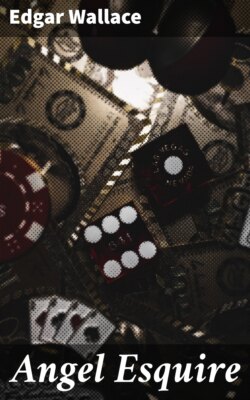Читать книгу Angel Esquire - Edgar Wallace - Страница 8
На сайте Литреса книга снята с продажи.
* * * * *
ОглавлениеTable of Contents
Going into Cabinda to land sixteen barrels of raw spirit for the civilization of Portuguese West Africa, the "second" of the Imagi found time to express his disgust at inquisitive passengers. The second officer was an excellent seaman, but had spent the greater part of his life "tramping", and the occasional passenger was a source of intense annoyance. The solitary passenger of the Imagi had come aboard at S. Paul de Loanda, and had worked a slow and inquisitorial way up the coast. He was a man desirous of acquiring information on every conceivable subject, but mostly his eternal note of interrogation was set against the question of curious watch charms.
He had buttonholed the entire mess-room, from the skipper to the fourth engineer, buttonholed them at inconvenient moments, held them helpless against bulkheads and immovable cabin doors, whilst he threshed out the question of "curios".
He caught the purser, unaccustomed to a passenger list and in awe of his solitary charge, and reduced him to a condition of incoherence bordering on imbecility; led him—he protesting feebly—to the tiny purser's office-cabin, domineered him into opening his desk and displaying his interesting collection of native table mats and crudely carved ivory napkin rings, and left him limp and perspiring.
It is also on record that on the transparent pretence of inspecting the chief engineer's domestic photographs—at his own artful suggestion—he insinuated himself into the chief's most private domains, and, leading the conversation to native customs (by way of patent medicines and native doctors), he caused the stout chief, at great personal inconvenience to uncord a box which had lain snug for at least two voyages.
On the ninth day of the voyage up from Loanda the steamer stood inshore.
A strip of yellow beach, with the inevitable fringe of palm trees, showed up over the horizon, and a patch of white stood for a white man's house—and civilization.
The inquisitive passenger standing by the third officer set up his monotonous interrogation.
"Basaka," said the third brusquely; "we always put in here. If you are keen on curios, this is the place to get 'em."
"What kind?"
"Oh, any kind. There is an old chap who lives a couple of miles in the bush who's the biggest medicine man on the Coast. Wait till the Kroo boys get ashore—you'll see nothing of 'em for a couple of hours. They always make a point of a palaver with the old man. They get medicine and charms."
"Basaka!" mused Angel aloud. "Isn't that where Sir Peter lived?"
The mate grinned.
"The governor! Yes." He looked around for the presence of his superiors. "He lived here for ten years, did the old man, and a pretty tough nut he was, from all accounts. Made all his money in oil and rubber—as thick as thieves with old Chingo, the Basaka king." He shook his head wisely.
"Oh," said Angel; and when the ship had anchored he went ashore.
Paterson, the tired-looking man at the factory, gave him a chair in the deep veranda, mixed him a cocktail, and furnished him with some information.
"Going into the bush!" he said in astonishment. "Man, you're mad. We're a British Protectorate, and all that sort of thing, we've got a company of Haussas along at Little Basaka—but it's not safe."
He whistled a native, and the man came running.
"Hi, Jim," he said in the villainous lingo of the Coast, "dem massa, he like go for bush, you savvy? For O'saka by them ju-ju man. You fit for take 'um?"
The man looked at Angel sullenly.
"I no be fit," he said in a low voice: "them ju-ju be bad for white man."
"You hear?" said the host.
Angel smiled.
"I hear," he said calmly, and addressed the man, speaking quickly and easily in the native tongue.
"What is your name?" he asked.
"Kosongo, master," replied the man.
"Why will you not take me into the bush?"
"Because of the Blind Man's Magic," answered the other readily. "I am afraid."
"Yet you shall show me the way. When the sun sets I will be by the big palm at the edge of the bush."
"I cannot come," said the man sulkily.
"By the dried heart of the goat you shall come," said Angel quietly; and the man shrank down until his hands were fumbling in the dust.
"I will come," he whispered.
Paterson looked on in amazement.
"What have you said to the chap?" he asked wonderingly, "and how the deuce did you pick up the lingo?"
Angel's reply was plausible, but not exactly true. Angel dined ashore, first sending a runner to Little Basaka, carrying a few words scribbled on the torn leaf of a notebook.
